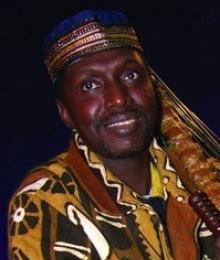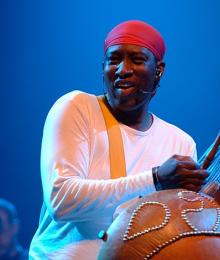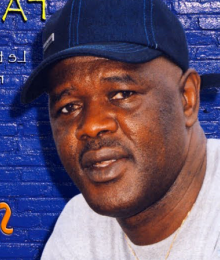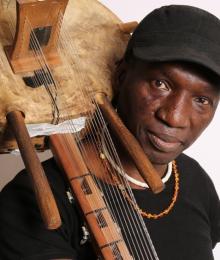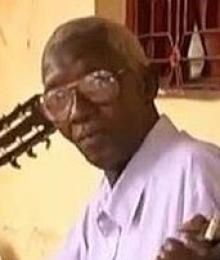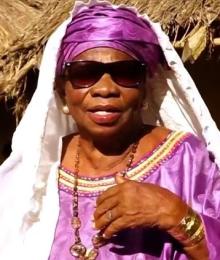
Ibro Diabaté, whose real name is Bouraïma Diabaté, is an iconic figure in contemporary Guinean music. Born in 1966 in the Boké region, he comes from a family of Diakhanké griots and has skillfully blended Mandingo musical traditions with modern sounds. His career truly took off in 1993 with the release of his first album "Allah Nana," which was an immediate success in Guinea and the sub-region.
Known for his clear and deep voice, Ibro sings in Diakhanké, Susu, and French, often addressing social themes in his compositions. His unique musical style fuses traditional Mandingo music with influences from funk, soul, jazz, pop, and zouk. Over the course of his 30-plus year career, he has released several successful albums, performed numerous national and international tours, and established himself as one of the most influential artists of his generation in Guinea. Ibro Diabaté is also known for his commitment to artists' rights and his role as a mentor to the new generation of Guinean musicians.
Introduction
Ibro Diabaté, whose real name is Bouraïma Diabaté, is one of the most iconic figures in contemporary Guinean music. Born in 1966 in the Boké region, this talented artist has brilliantly blended traditional Mandingo sounds with modern rhythms, creating a unique style that has won the hearts of millions of fans across West Africa and beyond. A griot by birth and musician by passion, Ibro Diabaté has marked the history of Guinean music with his captivating voice, socially engaged compositions, and innovative approach to musical arrangement.
Early life and Education
Born into a family of Diakhanké griots, Ibro Diabaté grew up in an environment steeped in music and oral tradition. From a very young age, he accompanied his mother and uncles during various events such as weddings, baptisms, and neighborhood celebrations. This early immersion in the Mandingo musical universe shaped his artistic identity and allowed him to acquire the foundations of his art.
However, young Bouraïma was not content to simply follow in the footsteps of his elders. In 1981, he left his native region for Conakry, the Guinean capital, to pursue his studies. But after two years, when his academic results did not meet his expectations, he decided to devote himself entirely to music, his true passion.
Artistic Career
Promising beginnings
It was in 1983 that Ibro Diabaté, then 17 years old, truly began his musical career. In Conakry, he had the opportunity to meet and collaborate with big names in Guinean Mandingo music such as Master Aliou Barry of Kaloum Star, Momo Wandel Soumah, and Kélétigui Traoré. These encounters allowed him to perfect his vocal technique, composition, and approach to orchestration.
Always eager to learn, the young artist went to Kankan to meet other important figures of the Guinean music scene, notably Djéli Balakala and Sidi Diabaté of the 22 Band orchestra. This quest for knowledge then led him to Mali in 1988, where he met his idol, the famous arranger Boncana Maïga.
Rise to fame
The turning point in his career came in 1992 when Néné Rouguiatou Baldé, manager of Gris-Gris Productions, offered him the opportunity to record his first album. Ibro seized this opportunity and suggested bringing in Boncana Maïga for the arrangements. This led to the creation of "Allah Nana," his first opus, which was released in 1993 and achieved immediate success in Guinea and the sub-region.
This first album marked the beginning of a meteoric career for Ibro Diabaté. His clear and deep voice, his socially engaged lyrics sung in Diakhanké, Susu, or French, and his unique musical style blending Mandingo tradition with modern sounds (funk, soul, jazz, pop, zouk) appealed to a wide audience.
Discography
Albums
- 1993: "Allah Nana"
- 1995: "Affaires"
- 1997: "Eh! Wotan"
- 2003: "Esclave de l'argent"
- 2006: "Kéré Wali Gbaka"
- 2011: "M Maloloe"
Singles and collaborations
Although Ibro Diabaté is primarily known for his albums, he has also released several singles over the years and collaborated with other Guinean and West African artists. These collaborations have enriched his repertoire and allowed him to reach an even wider audience.
Music videos
The artist has produced music videos for several of his most popular songs, thus strengthening his media presence and visually promoting his music.
Tours
Ibro Diabaté is known for his energetic and moving stage performances. He has conducted numerous tours throughout Guinea, performing in major cities as well as in the most remote regions of the country, thus reinforcing his status as a national artist.
With his popularity extending beyond Guinean borders, Ibro Diabaté has regularly toured neighboring countries, notably Mali, Côte d'Ivoire, Senegal, and Gambia, consolidating his reputation as a major artist on the West African music scene.
The artist has also had the opportunity to perform on international stages, particularly in Europe and North America, bringing the richness of Guinean Mandingo music to a global audience.
In 2023, he announced a major concert at the Zénith in Paris, proof of his continuing popularity with international audiences.
Prizes and awards
During his career, Ibro Diabaté received several distinctions which testify to the impact of his music and his contribution to Guinean culture. In 2004, he was elected best Guinean artist by the information site boubah.com (now Guineenews), an important recognition from the public and the media.
Although the precise details of all his awards are not available, it is undeniable that Ibro Diabaté enjoys great esteem in the Guinean and West African musical circles.
Private life
Although very discreet about his personal life, Ibro Diabaté is known to be a devoted family man. He is the father of several children, including his daughter Ibro Gnamet Diabaté, who has followed in his footsteps by becoming a recognized artist herself. She has released several singles since 2015 and has collaborated with other Guinean artists, notably Azaya.
Conclusion
With over 30 years in his career, Ibro Diabaté has established himself as one of the pillars of modern Guinean music. His exceptional talent, artistic commitment, and ability to marry tradition with modernity have made him a true cultural icon. Despite the challenges he has faced, particularly the piracy of his works, Ibro Diabaté continues to defend artists' rights and promote quality music.
His influence on the new generation of Guinean artists is undeniable, even though he remains critical of certain current trends that he considers too far removed from traditional values. As he prepares to celebrate his 30-year career milestone and a new album, Ibro Diabaté proves that he remains a major creative force on the African music scene, always ready to enchant his audience with his golden voice and captivating melodies.











